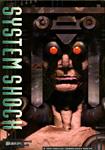
System Shock - Digital Antiquarian Retrospective
The Digital Antiquarian looks closely at the development of System Shock.
Doug Church, the driving creative force behind Ultima Underworld, longed to create seamless interactive experiences, where you didn’t so much play a game as enter into its world. The Underworld games had been a big step in that direction within the constraints of the CRPG form, thanks to their first-person, free-scrolling perspective, their real-time gameplay, and, not least, the way they cast you in the role of a single embodied dungeon delver rather than that of the disembodied manager of a whole party of them. But Church believed that there was still too much that pulled you out of their worlds. Although the games were played entirely from a single screen, which itself put them far ahead of most CRPGs in terms of immediacy, you were still switching constantly from mode to mode within that screen. “I felt that Underworld was sort of [four] different games that you played in parallel,” says Church. “There was the stats-based game with the experience points, the inventory-collecting-and-managing game, the 3D-moving-around game, and there was the talking game — the conversation-branch game.” What had seemed so fresh and innovative a couple of years earlier now struck Church as clunky.
Ironically, much of what he was objecting to is inherent to the CRPG form itself. Aficionados of the genre find it endlessly enjoyable to pore over their characters’ statistics at level-up time, to min-max their equipment and skills. And this is fine: the genre is as legitimate as any other. Yet Church himself found its cool intellectual appeal, derived from its antecedents on the tabletop which had no choice but to reveal all of their numbers to their players, to be antithetical to the sort of game that he wanted to make next:
In Underworld, there was all this dice rolling going on off-screen basically, and I’ve always felt it was kind of silly. Dice were invented as a way to simulate swinging your sword to see if you hit or miss. So everyone builds computer games where you move around in 3D and swing your sword and hit or miss, and then if you hit you roll some dice to simulate swinging a sword to decide if you hit or miss. How is anyone supposed to understand unless you print the numbers? Which is why, I think, most of the games that really try to be hardcore RPGs actually print out, “You rolled a 17!” In [the tabletop game of] Warhammer when you get a five-percent increase and the next time you roll your attack you make it by three percent, you’re all excited because you know that five-percent increase is why you hit. In a computer game you have absolutely no idea. And so we really wanted to get rid of all that super opaque, “I have no idea what’s going on” stuff. We wanted to make it so you can watch and play and it’s all happening.
[...]
Information about
System ShockSP/MP: Single-player
Setting: Sci-Fi
Genre: Shooter-RPG
Platform: PC
Release: Released

